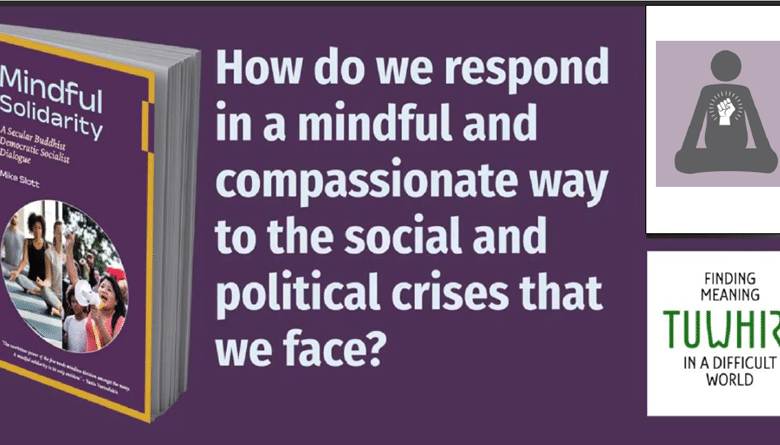POSTS:
Secular Buddhism

An invitation to a weekly dose of secular dharma
Lenorë Lambert is offering weekly emails in which she explores the Buddha's insights for human flourishing in our time.

What is Secular Dharma?: A Dialogue between Stephen Batchelor & Dave Smith
Stephen Batchelor and Dave Smith recently engaged in a dialogue on the secular dharma and how that approach can alter, expand, or challenge our practice.

An Online Discussion of Mindful Solidarity
On January 30, at 7 pm US Eastern Time, Craig Murphy, Seth Zuihō Segall, and Karsten Struhl joined Mike Slott for a discussion around his book, Mindful Solidarity: A Secular Buddhist Democratic Socialist Dialogue. The online discussion was sponsored by the Secular Buddhist Network and Tuwhiri, a secular Buddhist publishing imprint.

Exploring a secular dharma: SBN’s online course
SBN's free online course on explores key concepts a secular dharma. Participants in the course will go through the course modules, discuss the topics in each module with each other, and meet on Zoom every two weeks with the instructors for the course.

A conversation between Mike Slott and Winton Higgins on ‘Mindful Solidarity’
In a book launch event sponsored by the Secular Buddhist Network and Tuwhiri, a secular Buddhist publishing imprint, Mike Slott and Winton Higgins discussed Mike's new book, Mindful Solidarity: A Secular Buddhist Democratic Socialist Dialogue.

How you can get Tuwhiri books at a discount
Tuwhiri, a secular Buddhist imprint, offers a range of discounts on books bought in their online store, including one for SBN newsletter subscribers that runs until 31 December 2024

Mindful Solidarity book launch event
Mike Slott will be in conversation with Winton Higgins, the Australian secular Buddhist and author of Revamp: writings on secular Buddhism, to launch Mike's book Mindful Solidarity: A Secular Buddhist Democratic Socialist Dialogue

Reading groups
The Secular Buddhist Network sponsors two reading groups, and recommends those organized by Tuwhiri, a publishing imprint for secular Buddhist books. The reading groups explore books, articles, videos and podcast selections on topics related to secular Buddhism.

Mindful Solidarity – an idea whose time has come?
Ramsey Margolis discusses Mindful Solidarity, a new book by Mike Slott; in the book, the author argues that there is a need to integrate mindfulness with political activism as well as the ethical values of compassion and care

Tuwhiri: a secular Buddhist publishing imprint
Now with a presence in New York, Wellington and Sydney, Tuwhiri publishes books on early Buddhism, its retrieval, and a secular adaptation to 21st century conditions, as well as making available thought-provoking books that are not obviously dharma books but which serve the ethic of care that is central to the dharma

Ted Meissner’s Secular Buddhist Podcast
Over fifteen years and 337 episodes, Ted Meissner's Secular Buddhist podcast provided those interested in the secular dharma or a naturalistic approach to Buddhism with fascinating and insightful interviews with meditation teachers and writers.

A new eSangha: Secular Buddhism Ireland
A new secular Buddhist sangha, which meets online every Thursday, has been formed in Ireland.

I Try To Be Buddhist Just Like We’re All Newtonians
Jourdan Arensen argues that the Buddha's teachings are not cosmic truths. Instead, they provide us with a set of prescriptions for how to live ethically and cultivate well-being.

Upcoming courses and retreats for secular Buddhists
Upcoming courses, workshops, and retreats led by Stephen Batchelor and other teachers which focus on issues essential to developing a secular dharma.

Compassion and wisdom in times of division: Impressions from the Mind and Life Summer Research Institute
Carmel Shalev offers her reflections on how to cultivate compassion, mindfulness, and wisdom in times of intense change, divisions, and uncertainty.
EXPLORE BY SECTION
SEARCH THE SITE
RECENT POSTS









